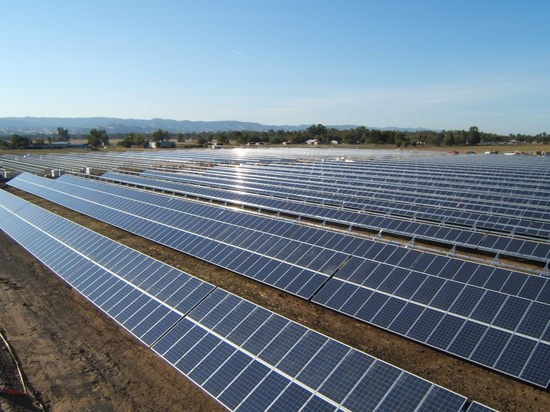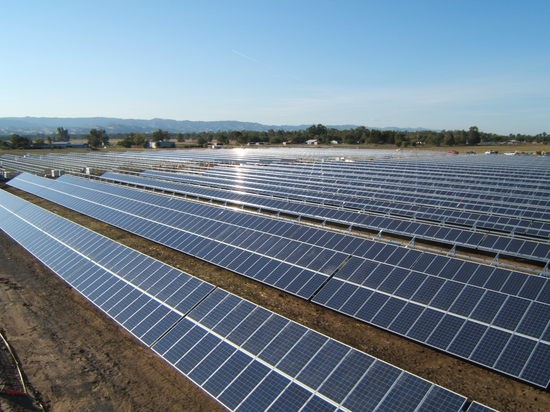 PG&E’s Vaca-Dixon Solar Station in Vacaville, Calif.Photo: PG&EAt an event at Google this week, green tech investor Vinod Khosla noted that solar companies are building factories in California even though it would be cheaper to manufacture photovoltaic panels in China.
PG&E’s Vaca-Dixon Solar Station in Vacaville, Calif.Photo: PG&EAt an event at Google this week, green tech investor Vinod Khosla noted that solar companies are building factories in California even though it would be cheaper to manufacture photovoltaic panels in China.
“The markets are here, the innovators are here, the ecosystem is here,” he said, noting that the state’s global warming law, known as Assembly Bill 32, or AB 32, had created a predictable regulatory climate, spurring investment in California.
Adding another data point to Khosla’s argument, AQT Solar, a Sunnyvale, Calif., startup, announced Thursday that it had officially flipped the switch on its first factory – in the heart of Silicon Valley.
The company’s trajectory is classic Silicon Valley and illustrates Khosla’s thesis of why California has become an epicenter of green technology innovation.
AQT was founded in 2007 by veterans of the Valley’s old-line tech industry who saw a way to repurpose existing technology to make cheaper and more efficient thin-film solar cells at a time when photovoltaic module prices were plummeting and competitors with high capital costs were being squeezed. (Thin-film solar cells are made by depositing semiconducting materials on glass or flexible materials, a process which allows them to be essentially printed on long rolls of metal.)
The startup managed to get to the production phase on $15 million raised from investors — a pittance for a solar cell manufacturer — and on Thursday the company also announced its first customer, the developer Sol Pacifico, which will install AQT solar cells at a luxury resort to be built in Baja Mexico.
The factory will initially be able to produce 15 megawatts’ worth of solar cells a year.
AQT has been able to recycle Silicon Valley’s old computer chip company infrastructure as well as tap its intellectual and financial capital.
“We found a building that was an old semiconductor plant that fit our needs perfectly,” says Michael Bartholomeusz, AQT’s chief executive. “In next six months, we’ll be expanding our Sunnyvale facility and hiring 40 more people. We’ll have a second manufacturing site next year.”
That’s not a huge number of jobs, of course, but inevitably some of those employees will capitalize on their experience at AQT and start their own companies, continuing Silicon Valley’s endless cycle of innovation.
Khosla’s point was that that feedback loop could be short-circuited if voters in November pass Proposition 23, a California ballot initiative that would suspend the state’s global warming law and with it the certainty businesses that rely on to make investment decisions.
“More of the startups in Silicon Valley are setting up factories here rather than in China, and that’s because there’s a market here,” he said. “That will change” if Proposition 23 passes.



